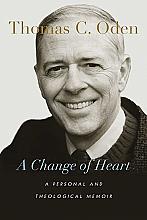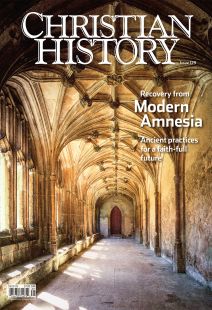Editor's note: Modern amnesia
THIS TIME, as they say, it’s personal.
I am a recovering victim of “modern amnesia.” Maybe you are too? This issue tells the story of Christian thinkers in the last half of the twentieth century who asked questions about faith and found the answers of the modern world unsatisfactory. When they consulted their own denominations for answers, those groups seemed to have forgotten something as well. These thinkers saw mainline Protestants and some Catholics straying from a commitment to the supernatural origins of Christianity and the inspired truths of the Bible, and they saw evangelicals ignoring devotional practices that had nurtured Christians for centuries.
In response these thinkers turned to the early Christian church fathers and mothers and their doctrinal commitments, devotional practices, and ways of worship. In so doing they found their lives transformed. With a gathering intensity, they began to speak, publish, meet, and found organizations devoted to spreading the good news to the rest of us.
Along for the ride
In this case I was along for the ride. I grew up in an evangelical United Methodist home (I once described my family as “conservative, but not the kind of conservatives that leave”) and went to seminary in the early 1990s. While there I discovered the writings of many people you’ll read about in this issue, especially Tom Oden, Bob Webber, Richard Foster, Dallas Willard, Kathleen Norris, Thomas Howard, and William Abraham. (The title of this issue echoes Abraham’s 1995 book Waking from Doctrinal Amnesia, a critique of liberal United Methodist theology.)
At seminary I learned of the riches of early church theology and devotion, and found my spiritual life strengthened by fasting, disciplined Scripture study, and frequent Holy Communion. Eventually I became Anglican. Webber describes people somewhat like me in his most famous book, Evangelicals on the Canterbury Trail—the “Canterbury trail” being a metaphor for a spiritual journey into Anglicanism. Of course many who were influenced by these thinkers remained in their original churches and worked to recover the riches of the early church there as well.
Attempt to understand
This issue is an attempt to understand a movement that, over the last few decades, has sought to combine the best aspects of evangelical and sacramental Christianity, grounded in the Bible and guided by the first few Christian centuries. We begin the issue with four writers and thinkers who speak mostly to Protestant evangelicals—Oden, Webber, Willard, and Foster—and then we move outward to trace a turn back to the ancient sources of our faith among Roman Catholic, Orthodox, and mainline Protestant figures. We also deal with the difficult question of whether renewal can sometimes revive things better left behind.
We hope this issue introduces you to many recent thinkers who have recovered the ancient Christian faith in all its glory. But we also remember what C. S. Lewis once said in his preface to an edition of Athanasius’s On the Incarnation:
Naturally, since I myself am a writer, I do not wish the ordinary reader to read no modern books. But if he must read only the new or only the old, I would advise him to read the old.
We hope the issue inspires you to discover the riches of the early church mothers and fathers for yourself, with these authors as your companions on the way. C H
By Jennifer Woodruff Tait
[Christian History originally published this article in Christian History Issue #129 in 2019]
Managing editorNext articles
“He made no new contribution to theology”
Tom Oden’s influential return to orthodox faith.
Christopher A. HallFulfilling a longing for the early church
An excerpt from Oden's Ancient Christian Commentary
Thomas C. Oden and Christopher A. HallTaking the long view back
Nineteenth- and twentieth-century renewal and cooperation
Jennifer Woodruff TaitSupport us
Christian History Institute (CHI) is a non-profit Pennsylvania corporation founded in 1982. Your donations support the continuation of this ministry
Donate






